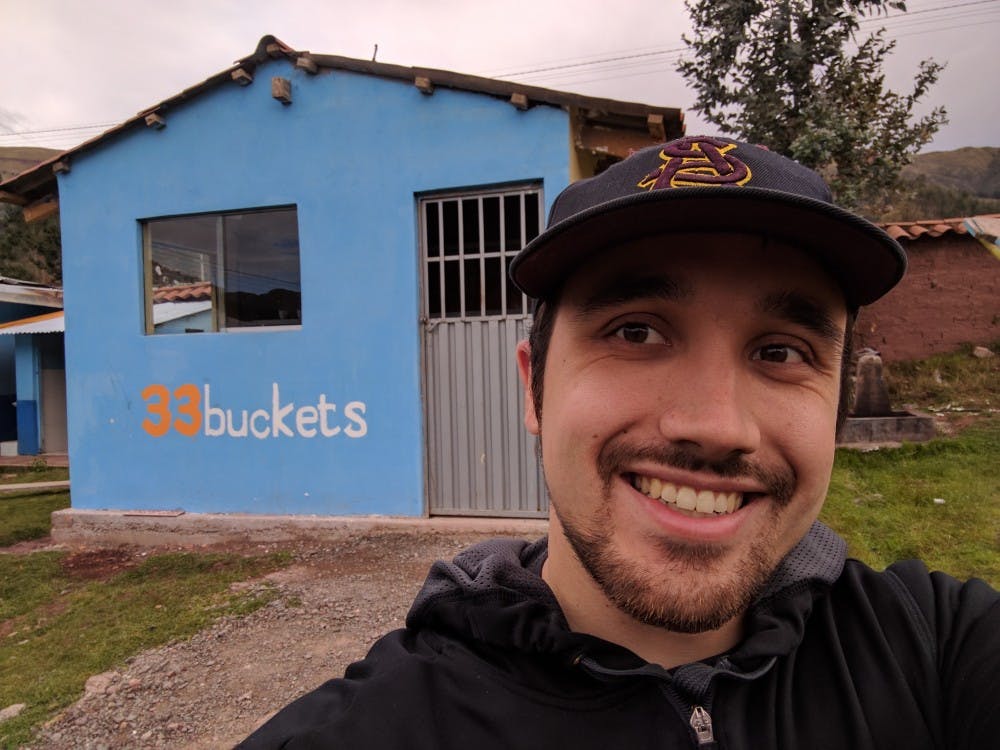What started as a school project at ASU to provide clean drinking water to girls at a college in Bangladesh, has grown to serve three countries and be featured on a local commercial during this year's Super Bowl.
33 Buckets is an organization that began as a project through ASU’s Engineering Projects in Community Service Program back in 2010. The organization allows students to solve real-world problems for charities, schools and non-profit organizations.
Some of the students who started 33 Buckets had their first initial project while working with ASU alumnus Enamul Hoque, who founded Rahima Hoque Girls’ College in rural Bangladesh to provide the school with clean water.
The co-founders of 33 Buckets decided to turn their project into a company that aims to bring clean water to countries that need it. Mark Huerta, one of the co-founders of 33 Buckets and an engineering education Ph.D student, was recently featured with the organization in a Super Bowl commercial.
“It really was ultimately about 33 Buckets and what we’re doing and sharing our story,” Huerta said. “A cool commercial that inspires others to actually really get involved and get the most out of their college experiences and try to help others.”
The filtration system in Bangladesh impacted over 900 students directly at the school and 12,000 people in the community, according to data from the organization. After its time in Bangladesh, the group decided to expand their efforts.
Swaroon Sridhar, a co-founder and biomedical engineering senior, attended a three-week seminar for Watson University in Philadelphia in 2015 as a representative of 33 Buckets. There, he found two more sites for 33 Buckets to expand to — Peru and the Dominican Republic.
Sridhar said that on the first trip to Bangladesh, the 33 Buckets team had learned that their business model had to expand to include education. If the people drink the filtered water with dirty hands or use dirty cups, then filtering the water wouldn't matter.
Sridhar said one of the organization's last days in Peru was one of the most profound for him.
It was the team's last day in the country, and they were leading a seminar for Peruvian citizens to understand how to keep water clean and distribute it effectively. They realized that there was too much chlorine in the water filtration system and that they were flushing it out.
As soon as the seminar released, a line of children and parents formed as they waited to try the clean water. Right after the seminar, the 33 Buckets team found that there was an appropriate amount of chlorine in the water and distributed the water to the community.
“(A community member) told us that she never imagined she would get to see clean water come to this community,” Sridhar said.
The next day, the team left Peru with clean water, which supplied 50 students at the local school as well as 200 people in the community.
While Sridhar said supplying water to the community is their main mission, the team is also focused on ensuring their filtration systems will last, so they keep in contact with community members to keep an eye on the filtration system.
“Our main selling points for our water filtration system is that one, it is very sustainable and longterm, and two, it’s cost effective because we build it for the community,” Sridhar said.
Paul Strong, a co-founder of 33 Buckets and MBA student at the WP Carey School of Business, said that 33 Buckets usually pairs with already established organizations in the area that they are looking to work in, in order to establish trust within the community.
“How we bridge that gap and build trust is we work with an organization that they already know and that has followed through on their promises,” Strong said.
33 Buckets are looking to expanding their presence in Peru with the support of its government. Strong, however, has higher hopes for the organization.
“What I see as a vision for 33 Buckets is to be a model for showing even other organizations how to effectively help communities address their clean water needs,” Strong said. “So eventually, we have a world where everyone has clean water.”
Reach the reporter at ndusanek@asu.edu or follow @NikkiDusanek on Twitter
Like The State Press on Facebook and follow @statepress on Twitter




